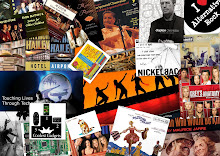I laughed when I saw the horror movie Scream 2. And it seems, I now have a good reason why.
Back when television content was not available at a click of a button, at your whims and fancies, when there was no Google to answer all your questions, the biggest change in our lives was the introduction of cable television. And the cable TV guide, of course.
Every month, when the cable guy came for the cheque, he would drop a cable guide, with reams of pages full of lists of television programs, sorted by time, in a really small print. It required skill to get through that. And I thought I had it.
One fine afternoon in March, right after school exams got over and we got the only vacation in the year, when there was no homework, tests or things to do, I decided to watch a movie. I poured over the TV Guide for an hour, trying to decide what to watch.
I pushed my pudgy finger along rows of data, trying to find just the right thing to watch. After much mental debate, I landed on my choice for the day. Star Movies was showing a comedy at 4:30 pm. And it's name was..wait..my finger moved cross across the columns, let me try again. The comedy at 4:30 pm was..Scream 2. Huh.
That's a weird name for a comedy, is a thought that should have crossed my mind. But it did not.
Satisfied with my choice, I gathered the required elements for a perfect comedy movie viewing. Popcorn, orange juice, pillows.
If only I had Google or basic knowledge about movies to avoid the psychological experiment that were to follow.
The movie started on the right notes. A few jokes here and there and I laughed more than was needed. It was a comedy, after all. At 4:45 pm, a murder happened in the movie. Followed, of course, by the scream face (which is a little funny, if you think about it). I laughed, because I genuinely thought the face was funny. And I also assumed that at this point, that the rest of the movie will be about a funny cover-up for this murder.
I kept laughing at the slightest hints of jokes, till the second murder happened. I laughed a little unconvincingly. But I thought, maybe, it's dark humour. Then the third murder. And I knew something was wrong.
I opened the TV Guide again and quickly ran my fingers through the column again, before I was forced to laugh at another gruesome murder. 4:30 pm....Scream 2....Horror.
Uh-hmm. I had mixed up two rows of genres. The comedy was to be screened next at 6:30 pm.
I turned off the TV and sat traumatized for an hour, till the actual comedy movie started. And it wasn't even funny.
I have not watched Scream since then. Lest I doubt my own moral instincts when I start laughing at the murders. o.O
That I found Scream funny, just because I expected it to is now an established phenomenon. Also known as Expectancy Theory, people tend to behave or act in a way to meet their expectations from the product or service.
In blind tastings for wine, the expensive wine does not always taste better. But somehow, when the price is disclosed, expensive wine is always tastier - simply because people expect it to. In a series of interesting experiments by Dan Ariely, he serves the participants beer with balsamic vinegar. When participants are not informed before the experiment about this addition, they rate the taste of the drink very highly. When participants are informed about the vinegar before they drink it, they are not too impressed by the taste, because why would vinegar taste good?
Turns out, we never really judge things the way they are. We judge them on the basis of what we expect from them. No wonder then that "succulent, tender, juicy chicken served with a side of crispy fries" tastes so much better than "chicken with fries".
Long story short, read tv guides and menus carefully. And have no expectations. Way simpler that way.

I remember watching on VCD in those days and for me theaters only meant Hindi movies. Enjoyed watching the Scream series, American Beauty and Saving Private Ryan or Shakespeare in Love. The good thing in those days was no google that made movie watching fun unlike now when I look for movie reviews online. :)
ReplyDeleteI agree completely! Reviews bias me so much!
DeleteWhy do long-term partners who choose to sleep in different beds still elicit sad, worried, or judgmental responses? Bed-splitting, it seems, is the ultimate relationship taboo, evoking a distant stoicism suited for the likes of aging British royals, but not dynamic, healthy couples.
ReplyDeleteSomehow, we have internalized the idea that to be in love is to put up with your partner’s snoring, insomnia, or thrashing midnight movements until the day one of you dies—or you break up because you’re so sleep-deprived.
In reality, co-sleeping has never been a consistent domestic norm. It likely varied across the ages, based on space constraints, and the need to stay warm. In addition, the very concept of marriage as being synonymous with love and an undying desire to be together is fairly new. These days, the practice varies across cultures - 82% of American couples slept in a bed with their partner, while just 63% of Japanese couples did.